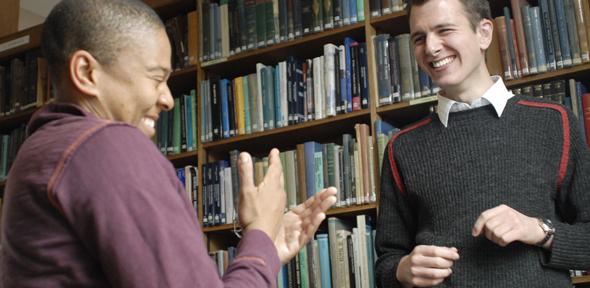
Last academical year the Disability Resource Centre (DRC) transferred from the HR Division into the Academic Division. The DRC is responsible for providing a range of confidential services to disabled students and those staff supporting them, working...
There are more than 1,600 disabled students at the University, approximately 9 per cent of the total student body.
What are the DRC’s key areas of business?
The DRC provides information, advice and support to students and staff supporting disabled students. It liaises with all incoming students who have declared a disability during their application, producing student support documents for colleges and departments outlining what support and ‘reasonable adjustments’ are recommended for each student. These might relate to specific learning difficulties, sensory or physical impairments, long-standing illnesses/health conditions, and Asperger syndrome/autism, among others. The DRC also coordinates the provision of non-medical assistants (such as note-takers, specialist study skills tutors and mentors) and advises on sources of financial support. It helps develop University disability policy, shares good practice, runs disability-specific training for University and college staff, and promotes its work and key disability equality issues across the collegiate University.
What are reasonable adjustments?
Universities have a duty to make reasonable adjustments for students, staff and other service users so that disabled people do not face ‘substantial disadvantage’ in comparison with non-disabled people. Reasonable adjustments are to be made in relation to:
• a provision, criteria or practice (for example, exam access arrangements)
• physical features (access to lecture theatres or laboratories)
• auxiliary aids (hearing loops, or support from non-medical assistants).
The duty of reasonable adjustment is anticipatory: provision should be planned and provided in advance. It is important to note that most reasonable adjustments are low cost or inexpensive.
Why has the DRC moved into the Academic Division?
The DRC’s principal responsibility is to prospective, incoming and current disabled students. Being located in the Academic Division puts the DRC at the heart of educational policy development (it reports to the Equality and Diversity Standing Committee of the General Board’s Education Committee) and ensures that its focus is on the provision of high-quality student services – both directly to students and those supporting them. The move forms part of a wider desire to co-locate key areas of the University involved in the provision of student services.
How does the DRC work with departments, faculties and colleges?
The DRC works closely with colleagues in colleges, departments and faculties in determining and establishing effective support for disabled students. Student support documents are a key tool in this process, highlighting the specific requirements of disabled students. The DRC also coordinates a network of Disability Liaison Officers (DLOs). These are individuals based in departments and colleges who are the first port of call for students, staff and visitors in need of advice on disability issues. DLOs have relevant practical experience of working with disabled people in the University, an awareness of the Equality Act, as well as the University’s disability-related policies and practices. They can check with the DRC if they need to take more specific advice. There is also a wide range of advice and information for departments and colleges on the DRC’s website.
Who are the key team members?
The Head of the Centre is John Harding. He is supported by his deputy (the Office Manager), five Disability Advisers, the Disability Development Consultant and a team of administrators and support coordinators.
Is there anything else I should know?
There are more than 1,600 disabled students at the University, approximately 9 per cent of the total student body.
I’m a disabled member of staff – where should I go to get advice?
Your first contact should be with your HR Business Manager (HRBM). There are seven HRBMs – one for each of the six Schools, and one for the UAS and non-School institutions. They can explain the various support services available within the University – for example, Occupational Health, the Safety Office, the Assistive Technology team in the University Computing Service – facilitating introduction or referral where appropriate. They can also advise on access to external funding and support.
